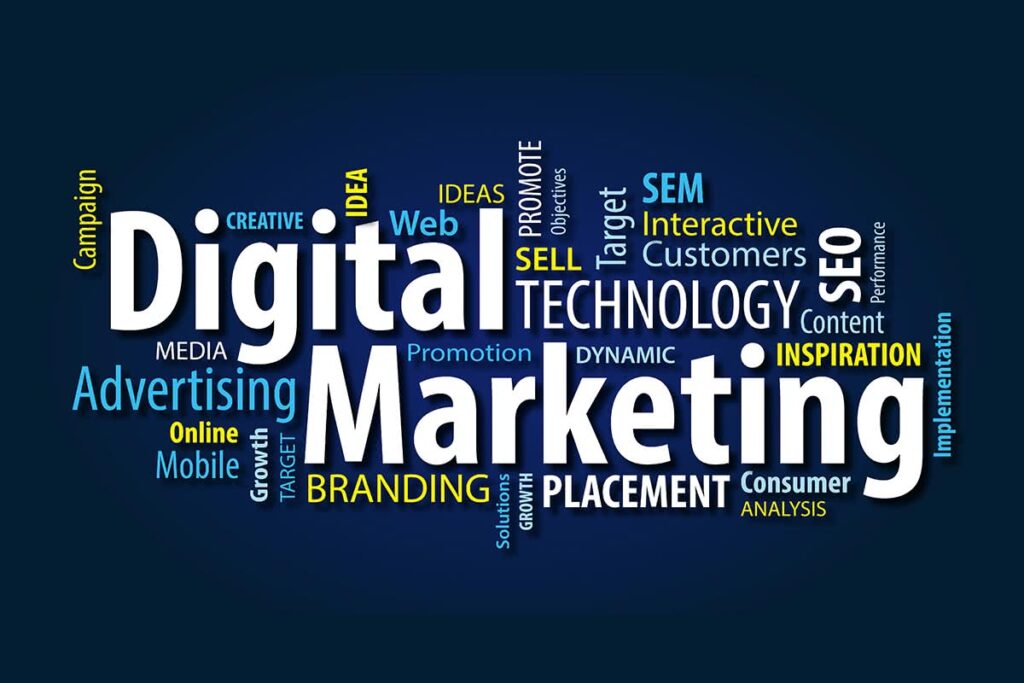Digital Marketing

Digital marketing strategy is the art of promoting goods or services using online platforms and technologies.
It covers a broad spectrum of techniques and approaches designed to connect with and captivate online audiences. By leveraging the power of the internet, businesses can connect with potential customers, build brand awareness, and drive sales. From search engines and social media platforms to email and mobile devices, digital marketing offers a multitude of opportunities to interact with consumers in a personalized and cost-effective manner.Digital marketing strategy.
In today’s digital age, consumers spend a significant amount of time online, making it imperative for businesses to have a strong digital presence. Digital marketing enables companies to understand their target audience better through data analytics, allowing for tailored messaging and campaigns. It also offers a higher degree of flexibility compared to traditional marketing methods, as it allows for real-time adjustments based on performance metrics.
Ultimately, digital marketing strategy is about creating valuable content, building relationships with customers, and driving conversions. By implementing effective digital marketing strategies, businesses can achieve sustainable growth, increase brand loyalty, and gain a competitive edge in the marketplace.
Creating Valuable Content:
Content is frequently described as the foundation of digital marketing strategy. In an age where consumers are inundated with information, creating valuable, relevant, and engaging content is essential. This content serves multiple purposes: it educates, entertains, and informs potential customers, positioning businesses as thought leaders in their respective industries.
Valuable content can take various forms—blog posts, videos, podcasts, infographics, and social media updates. Each format offers unique opportunities for engagement and information dissemination. For instance, a well-researched blog post can provide insights that answer common questions or solve specific problems, driving organic traffic through search engines. Videos can showcase products in action, creating an emotional connection that text alone often cannot achieve.
Furthermore, creating content tailored to the customer’s journey is critical. By understanding the different stages—awareness, consideration, and decision—businesses can craft targeted content that addresses the specific needs and concerns of their audience at each stage. This strategic approach not only boosts visibility but also enhances the overall customer experience.
Building Relationships with Customers:
Digital marketing strategy is inherently relational. Unlike traditional marketing, which often focuses on one-way communication, digital channels facilitate two-way interactions. Building relationships with customers is about more than just transactions; it involves fostering trust and loyalty.
Social media platforms, for instance, provide an excellent avenue for businesses to engage with their audiences. Regular interaction—responding to comments, sharing user-generated content, and conducting polls—helps cultivate a community around the brand. This engagement can lead to brand advocates who promote the business organically, further enhancing its reach and credibility.
Email marketing is another powerful tool for relationship-building. By segmenting audiences and personalizing communication, businesses can deliver tailored messages that resonate with individual customers. This personal touch not only improves engagement rates but also creates a sense of belonging, encouraging repeat purchases and brand loyalty.
Driving Conversions:
At the end of the day, the ultimate goal of digital marketing is to drive conversions. This could mean different things depending on the business model—whether it’s completing a sale, signing up for a newsletter, or filling out a contact form. Effective digital marketing strategies employ various techniques to guide potential customers through the conversion funnel.
Utilizing data analytics is crucial in this context. By analyzing user behavior, businesses can identify trends and patterns that inform their marketing strategies. A/B testing, for instance, allows marketers to experiment with different content, layouts, and calls-to-action (CTAs) to determine what resonates best with their audience. This data-driven approach not only enhances conversion rates but also optimizes marketing budgets by focusing efforts on the most effective strategies.
Moreover, implementing effective conversion rate optimization (CRO) techniques ensures that the traffic generated through digital marketing efforts is effectively converted into leads or sales. This might involve simplifying website navigation, optimizing landing pages, or ensuring that the checkout process is seamless.
Achieving Sustainable Growth:
Sustainable growth in business is predicated on adaptability and responsiveness to market changes. Digital marketing strategy provides businesses with the agility to pivot their strategies in real-time based on consumer feedback and market trends. This flexibility is crucial in an environment where customer preferences can shift rapidly.
Investing in digital marketing strategy not only drives immediate results but also lays the groundwork for long-term success. Building a strong online presence and a loyal customer base creates a stable foundation for future growth. Additionally, as digital channels evolve, businesses that are already established in the digital space will find it easier to adapt and leverage new opportunities, whether through emerging platforms or innovative technologies.
Increasing Brand Loyalty and Gaining a Competitive Edge:
In an increasingly crowded marketplace, brand loyalty is a vital differentiator. Businesses that prioritize building relationships and delivering valuable content are more likely to foster loyalty among their customers. This loyalty translates into repeat business, positive word-of-mouth referrals, and a resilient brand reputation.
Moreover, a strong digital marketing strategy can significantly enhance a company’s competitive edge. In a world where consumers have myriad choices at their fingertips, a brand that stands out through authentic engagement, high-quality content, and excellent customer service is more likely to attract and retain customers.
Conclusion:
Ultimately, digital marketing strategy is a multifaceted discipline that encompasses the creation of valuable content, the building of meaningful customer relationships, and the drive for conversions. By implementing effective strategies, businesses can achieve sustainable growth, enhance brand loyalty, and secure a competitive edge in the marketplace. In an era where digital presence is paramount, embracing these principles is not just beneficial but essential for success.
